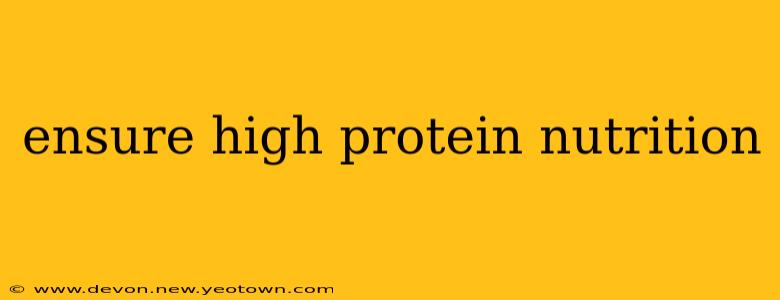Protein. The very word conjures images of bulging biceps and sculpted physiques, but its importance extends far beyond aesthetics. Protein is the fundamental building block of our bodies, crucial for everything from muscle growth and repair to hormone production and immune function. Getting enough high-quality protein is not just beneficial—it's essential for optimal health and well-being. This isn't just about bodybuilders; it's about everyone striving for a stronger, healthier life.
Let's embark on a journey to understand how to incorporate sufficient protein into your diet, addressing the common questions and concerns along the way.
What are the best sources of high-protein foods?
The beauty of protein lies in its versatility. There's a wealth of delicious and nutritious options available, catering to various tastes and dietary preferences. Let's explore some top contenders:
-
Lean Meats: Chicken breast, turkey breast, lean beef, and fish (salmon, tuna, cod) are excellent choices, packed with protein and essential nutrients. Remember to choose lean cuts to minimize unhealthy fats.
-
Eggs: A classic protein powerhouse! Eggs are incredibly versatile, easily incorporated into breakfasts, lunches, and dinners. They're a complete protein, meaning they contain all nine essential amino acids.
-
Legumes: Lentils, beans (kidney, black, pinto), chickpeas, and soybeans are fantastic vegetarian and vegan protein sources. They also provide fiber, essential for digestive health.
-
Dairy Products: Greek yogurt, cottage cheese, and milk offer a convenient and readily available source of protein, calcium, and other essential nutrients. Opt for low-fat or fat-free varieties.
-
Nuts and Seeds: Almonds, cashews, chia seeds, flaxseeds, and pumpkin seeds are excellent sources of protein and healthy fats. A handful can provide a significant protein boost.
How much protein do I need per day?
This is a question with no single answer. Individual protein requirements vary based on factors like age, sex, activity level, and overall health goals. Generally, the recommended daily allowance (RDA) is around 0.8 grams of protein per kilogram of body weight. However, athletes, individuals with certain medical conditions, or those aiming for muscle growth often require significantly more. Consult a registered dietitian or nutritionist to determine your personalized protein needs.
What are the benefits of a high-protein diet?
The advantages of sufficient protein intake are numerous and far-reaching:
-
Muscle Growth and Repair: Protein provides the building blocks for muscle tissue, crucial for strength training and recovery.
-
Weight Management: High-protein diets can promote satiety, reducing overall calorie intake and aiding in weight loss or maintenance.
-
Increased Metabolism: Protein requires more energy to digest than carbohydrates or fats, boosting your metabolism slightly.
-
Stronger Bones: Adequate protein intake supports bone health and reduces the risk of osteoporosis.
-
Improved Blood Sugar Control: Protein can help regulate blood sugar levels, benefiting individuals with diabetes or insulin resistance.
-
Enhanced Immune Function: Protein plays a critical role in immune system function, supporting the production of antibodies and other immune cells.
Can you get too much protein?
While protein is essential, excessive intake can have potential downsides. Very high protein diets can strain the kidneys, especially in individuals with pre-existing kidney issues. Additionally, an over-reliance on protein might displace other crucial nutrients in your diet. Moderation and balance are key.
What are some easy ways to increase protein intake?
Incorporating more protein into your daily diet doesn't require a complete overhaul. Here are some simple strategies:
-
Add protein to every meal: Include a source of protein in breakfast, lunch, and dinner.
-
Choose protein-rich snacks: Opt for nuts, Greek yogurt, or a protein shake between meals.
-
Experiment with different protein sources: Keep your diet interesting by trying various protein-rich foods.
-
Use protein powder strategically: Protein powder can be a convenient way to supplement your protein intake, particularly after workouts.
Conclusion: Fueling Your Body with Protein
Ensuring high-protein nutrition is a journey towards a healthier, stronger, and more energetic you. By understanding your individual needs, choosing diverse protein sources, and maintaining a balanced approach, you can unlock the numerous benefits of this essential macronutrient. Remember to consult with a healthcare professional or registered dietitian for personalized guidance tailored to your specific circumstances. Your body will thank you for it!

